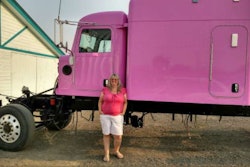Many women truck drivers oppose the proposed federal regulation that would require most heavy-duty trucks be equipped with technology that would limit their speeds. More than a few of them have posted their comments on the government website created to collect public comments.
The deadline for commenting is Dec. 7, and drivers can have their voices heard online.
Here’s a selection of some of the comments made by women truck drivers. A total of more than 3,500 comments — by women and men, truckers and non-drivers alike — have been made so far.

Try instead to educate the public about slow trucks and driving around us.
Doreen Mills: “I have been driving for 31 years. Speed limiters will only hurt the industry and create more road rage on the highways. Car drivers get angry when they are behind a slow truck. Ask the legislator from Arkansas why he raised the speed limit for trucks to 70 mph. He was behind a 65 mph truck trying to pass a 62 mph truck. Personally speaking my truck gets its best fuel mileage at 70 mph. Please rethink this rule (as) it will cause more harm than good. Try instead to educate the public about slow trucks and driving around us. Thank you.”
Lois Sessions: “As a long time veteran driver; if you limit the speed of vehicles over 26,000 lbs. you are inviting disaster to the highway safety system. We will have the general public that drive cars, recreational vehicles, motorcycles, etc. running their vehicles into the back of the trucks. The speed limiters are no better than the split speed limits of our past/present. So why can’t we educate the drivers instead of limiting the equipment? Better yet, make every person that has a driver’s license ride with a trucker for one month and maybe safety on the highway would then become more realistic. Train the drivers and the general public; don’t limit the equipment.”
Mary Howard: “As a driver of a commercial vehicle I support setting a maximum truck speed limit, 68 would be ideal. That would allow trucks to spread out from each other while allowing car drivers to move away as well. I also feel that not enough emphasis is being placed on training of new commercial drivers, which is making the highways very unsafe as well. Governing trucks at one speed would create long convoys, which in turn will lead to more cases of road rage as car drivers attempt to pass the trucks so they can take an exit off of the interstate or a highway. Allowing companies to set their truck speed will create a steady flow in the traffic, as not all companies will govern at the maximum speed. I’m also worried about the impact to the freight market by governing all trucks below 68, as it will take longer to move freight between two points. Thank you for your time.”
Diana Parris: “I’m am a million mile driver and I have a few questions. How many total vehicles with gross weight are on the highways everyday? Of those commercial vehicles, how many fatality accidents happen every day? What is the percentage of total commercial miles driven daily in this country? What is the percentage comparison of accidents per miles and fatalities? These are just a few questions. Professional drivers spend more time avoiding road rage and soccer moms with cell phones than we do loading and unloading freight. As the baby-boom generation retires, how many new drivers enter the workforce, which keeps this country moving and supplied? How many multi-million mile safe drivers will the industry lose if speed limiters are mandated? The continued mandates imposed on drivers makes the job more difficult trying to keep everyone from FMCSA to corporate employers happy. The time restrictions of electronic logs and unavailable parking is a logistics hodgepodge at times. This is the only occupation which the government limits how much drivers earn by limiting how much work can be accomplished. New drivers cannot be enticed to enter the job market with the promise of limited earnings, limited home time, and unsafe speeds when everyone has families to feed and children to raise. I do NOT agree with this proposal and will seriously consider leaving the industry if such a rule is imposed. This occupation is dangerous enough without the limits of being unable to stay out of harm’s way.”I do NOT agree with this proposal and will seriously consider leaving the industry if such a rule is imposed.
Karen Barron: “I am an owner/operator of three trucks — car haulers. I feel that the use of speed limiters will not only cause economic disasters for myself but also for the economy. I drive coast to coast and have driven for over 20 years — no tickets, no accidents. Many close calls due to split speed limits for cars and trucks. Trucks cannot maintain a consistent speed going up a grade or down a grade. When trucks try to pass other trucks all will be going the same speed causing what we call drag racing up a grade (even a small one) for miles. This angers four-wheelers and they try to pass on the sides, between the trucks and anything else they can try to get around the trucks. This poses a very dangerous condition.
Economically, I will have to push my truck as hard as it will go, if my speed is governed, to try to keep up the miles that I can currently do. This causes hard wear on the truck along with making me more tired to have to try to make up the miles in the 14-hour clock we have to work with. Also, loads will not be delivered (in) a timely manner causing time delivery problems where many loads are of time-critical. That means more trucks on the road to try to make up the lost time; more trucks, more accidents.
I am totally against speed limiters. This seems to be infringing on my workload and ability to perform my career in a professional manner. This seems to be detrimental to the economy of myself, companies and safety of all of us on the road.
Please reconsider this totally ludicrous law and jump in a truck and see what life is life as a truck driver just for a couple of days. You will realize what a vital service we provide. Everything you purchase is brought to you by a truck — let us do our jobs to the best of our ability.”
If you want to make the roads safer limit the non-trucks to 75 mph!
Laura Whitten: “Speed limiters set at 65 mph is a horrible idea. In states that already have split speed limits, one for cars and one for trucks, it is very dangerous. As a truck driver I cannot get over to let people merge onto the highway if my speed is lower than the cars in the left lane. I cannot get over for stopped emergency vehicles on the shoulder. I cannot pass a vehicle in front of me traveling below the posted speed limit. Vehicles coming up behind me that are traveling 5, 10 or more mph faster than me often do not realize I am going so much slower than them until the last second. This increases the chances of vehicles running into and/or under my trailer. If you have all trucks on the highway governed at 65 mph you will have a rolling roadblock. No one will be able to get on or off of the highway because the right lane will be full of a continuous line of trucks. For safety reasons I try not to run “in a pack” with other trucks. Limiting all trucks to 65 mph will make this impossible to avoid. If you want to make the roads safer limit the non-trucks to 75 mph!”
Heidi Bowlby: “I’m a owner/operator. I don’t spend all day, everyday wide open in my truck but there are several occasions where being able to go 70 and 75 mph is needed. I’m very much against this speed limiter law, I pay for everything on my truck just as someone driving a car pays for theirs. This rule is letting cars be the exception to the rule. Why should we be forced to go at a certain speed limit when there is already posted speed signs that were made by (the) DOT? DOT made the signs for a reason and they thought they were sufficient enough for over 100 years now. I’m confused about what part in this rule makes sense to only limit trucks, but what I’m not confused about is how this a clear blatant disregard for our so-called freedom. Is it not enough that we are being forced already to spend more money to be able to go into California? Is it not enough we are being forced to spend our hard-earned money to put a e-log in the truck when paper logs have worked just fine and the paper log runners aren’t even the ones causing the accidents. So now DOT feels the need and desire to control one more thing and have their hand in our pocket. Let me say this rule is the equivalent of me saying you own a home, but I’m going to make a rule that you have to spend money on a electronic device that will limit your TV time or your clothes washing time. How would (it) make you feel if someone essentially is taking away your freedom on something that you own that you paid for. The only difference is this truck is our way of living and we should have the freedom to go just as fast as the other vehicles on the road we have a schedule to keep cars for the most part do not so why is it fair to take our freedom away. I believe DOT is severely overstepping their (bounds) on this rule and hopefully come to their senses.”
This proposal is unnecessary government regulation and meddling at its finest.
Tara Heil: “As both a commercial driver and a driver of a regular passenger vehicle, I am absolutely opposed to the proposal requiring the installation of speed limiting devices on heavy trucks and buses.
There are two major arguments in favor of this proposal.
The first is that it will increase safety on the roadway. This is an absolute impossibility. Maintaining a steady, even traffic flow with ALL vehicles on the road running a speed that is appropriate to current road and traffic conditions is key to creating safe driving conditions. Limiting all heavy trucks and buses to a speed slower than of the other vehicles creates hazardous conditions for all drivers; many locations that have split speed limits are phasing them out for exactly this reason. When trucks are forced to run a slower speed, passenger vehicles are constantly forced to pass them — creating unsafe traffic conditions for every driver on the road. In addition to creating an uneven traffic flow, speed limiters will be a major contributor to road rage in any area with heavy traffic as passenger vehicles driven by impatient drivers become stuck behind heavy trucks and buses that are running their government-mandated maximum speed. In addition, there are times that, for the sake of safety, it is necessary for trucks to slightly exceed a speed limit — for example, during gear shifting or passing a slower vehicle in an expeditious fashion. Mechanical limiting that would prevent a truck from doing this is a problem waiting to happen.
The second argument in favor of this proposal is that it will save money. This assertion is questionable at best. The calculations done in the FMCSA’s study of this proposal look at reduced diesel fuel consumption and reduced tire usage — theoretical figures that are easy to quantify and that the administration says will balance out the additional cost of delayed shipments. The study didn’t consider the increased human cost of drivers forced to sit in the seat longer because where they once were driving 75 mph, they’ll be forced to only drive 60 (most drivers are paid by the mile, not by the number of hours they’re sitting in the seat, so their pay is not going to increase even though the length of time they’re working will). Nor did it consider the cost of additional accidents due to uneven traffic flow and increased road rage incidents. These statements are in addition to the fact that smart businessmen know how to save money and will either (a) voluntarily limit the speeds of their large trucks without government involvement, or, more likely, (b) consider the actual total costs of doing so and determine that doing so is not actually saving them money.
This proposal is unnecessary government regulation and meddling at its finest. Commercial drivers are well trained to do their jobs. FMCSA’s own studies have shown that drivers of large trucks have fewer accidents per mile driven than passenger vehicle drivers. We already have “speed limiters” in the form of police and state patrolmen/troopers who monitor our every mile; a mechanical speed limiter on every heavy truck is an insult to these fine state servants and their ability to do their job. And, in closing, it is not ever the government’s job to tell an American businessman that he HAS to save money. Choosing where to save and where to spend is the businessman’s choice, and he is capable of making it without a government mandate.
Thank you for considering these comments. Please do not turn this proposal into law.”
Sandra Griffin: “I have been a trucker for almost 21 years. I drove for three (years) before CDLs. I can see a 70 mph speed limit, but no lower. There (are) a lot of (owner/operators) that think going 75 and above is the thing, but they are just as dangerous as a car. Steer tires are not made for that kind of speed. I say slow down the super truckers. My truck is governed at 70 mph and I am happy with that. I do like coming home at night. I like my life. I would rather live than die!”
Helen Croy: “As a truck driver with over 15 years behind the wheel, I have this to say: Do not turn down the speed on trucks. All this will do is cause more traffic jams and accidents. I see this now with companies that only go 62 mph. As an owner/operator you will kill our small business. If you have never been out on the road as a driver, how do you or could you know what are issues are?”
A note to officials pushing this reg: When you are stuck behind that big truck and cursing because they are slowing you down, remember, this was your idea.
Kate Long: “The speed limiter rule is a poor idea. As a driver of a truck I can tell you that the worst thing is being stuck behind two big trucks going the exact same speed, but one has decided to pass the other. It causes traffic back ups, and if you think people are road raging now, wait until you see what happens if this rule becomes law. Cars are impatient with trucks as a general rule and drivers of cars rarely understand why a big rig can’t pass another big rig. They don’t understand about governing speeds and that a driver isn’t necessarily trying to be a left lane road slug, all they know is they can’t drive 80 because the big truck in front of is too slow. This will add stress and angst to a driver (car or truck) who is already a road rager just waiting to go off. Go ahead and pass the law, and after more than a few violent confrontations on the road (inadvertently including innocent drivers), maybe law enforcement will convince the guys sitting in the offices (who’ve never driven a truck) that speed limiters are a bad idea. A note to officials pushing this reg: When you are stuck behind that big truck and cursing because they are slowing you down, remember, this was your idea. Time for a big helping of crow.”
I’ve earned my right to be able to do the higher speed limits, 70 and 75 in some states, and I should be able to since I paid for my truck, and I have 25 years of driving experience.
Diane Sader: “I have been an owner/operator for 11 years and have seen there is already a problem with trucks that are company governed. You have two of the same trucks side by side trying to pass the other and they are holding up traffic, making people drive aggressively, having been “stuck” behind these two trucks. Neither truck is going to back down for either ego purposes or just being mean. Instead of governing trucks, enforce the laws of slower vehicles passing or holding up traffic. It also becomes a hazard or dangerous when governed. Seeing a potential problem ahead and not being able to speed up to avoid a hazard in the road, slower traffic or distracted driver, can and is already a problem for current governed trucks. Those trucks having to brake suddenly and hard makes for a very bad scenario now. Imagine that with ALL trucks not having a choice to speed up. Yes, slowing down is an option, but the more options you have the better choices you can make. Taking away the ability to speed up or go just a little faster, leaves just one option. When going to certain Canadian provinces I have to govern my truck, as per their law, and that is where I encounter a lot of problems. Even though I’m governed in their province, their country’s trucks go faster than I go so there is another problem, enforcement of governed trucks, whether they are Canadian or American. Letting traffic on an interstate is the worst when speeding up has definitely helped. A lot of trucks can’t hurry on an interstate merge and being able to move quicker helps. Slowing down can become a problem with more traffic and especially more distracted drivers rear ending someone, slowing to let very slow traffic on. I personally have seen no benefit to governing trucks. I bought my current truck, in 2013 with the ability to do what I wanted when I wanted. Governing my truck just takes away my choices of driving safely, with my own vehicle, that I paid well over $100,000 for. Buy a house with the availability of 6 rooms 3 bathrooms, but then after moving in, be told you can only use two rooms and one bathroom. Makes no sense for anyone, other than a company truck, to be governed. They go into that truck, with that company, knowing they can only go one top speed. I’ve earned my right to be able to do the higher speed limits, 70 and 75 in some states, and I should be able to since I paid for my truck, and I have 25 years of driving experience. Putting a newer, less experienced driver in a governed truck is exactly as it should be. Keep the governed trucks as company truck only Please! Thank you for taking the time to review my comment.”
Connie Lyda: “I feel the limiters on trucks are only going to make things worse. When you have split speed limits there seem to be more accidents and lots more road rage. It is bad enough with the split limits now. You need to think about all the trucks running side by side trying to pass because one doesn’t pull a hill as good as the other and all the cars being held up and getting madder by the minute. I’ve been a truck driver for 27 years and just my opinion but I don’t think it’s a good idea at all.”











